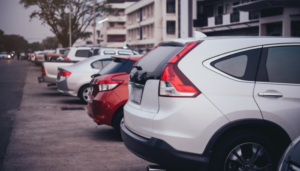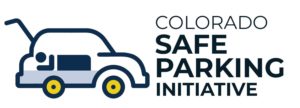
This week, we got to catch up with a graduate of Colorado Mental Wellness Network’s Peer Support Specialist Training, Rochelle Brogan. In addition to her work in peer support, Rochelle has recently founded a new non-profit in Denver, the Colorado Safe Parking Initiative.
Can you tell us about the Safe Parking Initiative? How did it start?

Last year I was working as a Peer Resource Navigator and I came across an article in the LA Times about safe parking programs across California. I was immediately interested and began researching it. It is a great program that helps folks that were living in their cars, and I found that there was nothing like that here in Colorado…
This struck me, because I was regularly helping people find housing and when I found out we didn’t have that resource I knew there was an opportunity. There were lots of people coming to me needing parking. I had seen that newly homeless people want to hang onto their assets (like their car), and choose to live in their cars. I began exploring how to do something about this.
My background has always been in direct service helping people battle substance use and mental health, and didn’t know anything about non-profits, but I did know a lot of people in that world. So, I began floating the idea of safe parking around, and ended up meeting my co-founder, Chelsea Baker-Hauk. May 2019, we attended a conference at University of Denver, exploring innovations in solving housing issues. At the end of it they asked for questions, and I stood up and told them I was trying to start a safe parking program to gauge interest in others who may want to work on the program. From there, I was introduced to the grand challenges team at DU, who informed me they had already been interested in a safe parking program. Then with the help of DU, we were able to incorporate and file for a 501c3 with the federal government!
So, how does the Safe Parking Initiative work?
The basic premise is to get permission for folks to sleep in a safe place so neighbors don’t call police, they don’t have to worry about crime, or other issues. It is then open 6pm-8am so people can park and sleep and have access to basic necessities like restrooms, handwashing, and housing.
Something that is critical to me is that these are trauma informed places and programs. That starts with the language we use. For example, when people come to the safe parking areas, they sign a “mutual respect agreement”, we do NOT give them rules on how to live their lives. It’s so important that we treat people with dignity, and respect.
I get so excited talking about it, we have so many people helping: Colorado Coalition for the Homeless, MHCD, DU, and many more. It really is a no brainer: it’s a low hanging fruit, especially compared to the funding, lead time, codes, and more that go into building a shelter. You can organize safe parking quickly and help a lot of people without much investment.
Where are you all currently operating?
Today we are working toward serving the 7 counties of the front range. We’ve found the communities really wants this, and are excited to participate. There a few churches in Broomfield that have decided to start doing this on their own, without financial support, out of the generosity of their heart. It continues to organically grow as there are locations in Lakewood, Jefferson Country, and Adams county that are all in progress.
In Boulder/Longmont, a new project started last month in a beautiful church, they have showers, handwashing, and have opened the church for people to use resources to cook, do laundry, and provide meals to people.
Last December we had a meeting with Denver city council, councilmembers agreed to lead the work on this in Denver. While we’ve encountered challenges with COVID19, we are still pushing for a solution in Denver with supervised camping, safe parking, and tiny homes. The only solution to homelessness is housing, and Denver doesn’t have enough affordable housing. We’ve been looking at different sites, and are excited to make it happen in the city!
Why is this program so important today?
With the current economic situation and the eviction moratorium being gone, folks are vulnerable. People, especially those in the service industry, can’t work and they don’t have any money. So how are they supposed to pay their rent? And even with the relief, the rent doesn’t go away: they will have to pay months of rent in backpay, and I’m so scared there will be a huge influx of newly homeless folks in the coming weeks/months. We’ve already started to see it…
For people who have never been homeless before, they don’t know how to navigate homelessness, don’t know how to navigate they systems and resources. I think this is going to be a huge explosion, and we are going to need programs like this.
How can someone help support your program?
 They can get in contact with us on our website Colosafeparking.org. On our site, there is a “connect” submission form to send us their name, organization name, or who they are and how they are interested in helping. We also have open monthly meetings that anyone can join. I chair those meetings and they are usually the last Friday of the month 11-1230 on zoom and anybody can come
They can get in contact with us on our website Colosafeparking.org. On our site, there is a “connect” submission form to send us their name, organization name, or who they are and how they are interested in helping. We also have open monthly meetings that anyone can join. I chair those meetings and they are usually the last Friday of the month 11-1230 on zoom and anybody can come
What are your goals for using Peer Support to benefit the folks in this program?
We were really inspired by the program in San Diego, Dreams for Change. The program has tons of wrap around services like a mobile vet, shower trucks, laundry tucks, food banks, literacy tutoring and more. These services allow them to create a sense of community. I am a firm believer that you can’t recover if you don’t have any community, we are social beings that need each other.
I would like to see us eventually incorporate more and more of the wrap around services, and peer support has been really miraculous: I’ve seen the miracles happen. The thing about peer support is that the people that you are serving will open up so much more quickly as it’s always a voluntary thing, and people are interested in getting help.
This great new explosion of peer support worker could be really valuable in safe parking. We are just starting but it would be great to get peer supporters work and help do the housing navigation for guests.
You mentioned seeing miracles in peer support. How has peer support made a difference in the lives of other folks you’ve worked with previously?
There was one really amazing gentleman who I met at the Denver public library who had experienced homelessness for over 10 years. He suffered from severe mental health conditions and was too afraid to go to a shelter or meal handouts, so he survived truly on his own sleeping outside and finding food from the trash. It was heartbreaking and I was able to identify with him.
He was so scared and nervous that he didn’t want to have anything to do with me as I tried to help. One day, Sarah (a CMWN team member) and I decided to invite him to lunch. We brought him into the office, sat down and shared nutritious, calorie dense, food. We sat down and just had lunch like how normal people do: asked about hobbies, movies, and just had a great conversation.
We started to do that on a regular basis for about 9 months. I was supporting him as a person who knows what it’s like to be treated poorly by the community because of mental health. I was able to identify with him and support him. Throughout this process, he began to tell us more and more of his story. Eventually, he became comfortable enough to allow us to conduct a survey to help determine his eligibility for housing. I wrote a psychosocial report and delivered it to a committee to help him get housed.
How has being a Peer Support Specialist impacted you and your life personally?
In 2000 I was in a fatal car accident. I hit a child that had darted onto the road that I never even saw. After this, I had a severe mental health breakdown. I couldn’t get out of bed. I had just moved here, and I didn’t have a support network.
For years I tried to work through it: trying to get back to work, to finish my degree and seek professional help, and then in 2006 I had a stroke. I could no longer work, and then suddenly I was homeless. I tried renting rooms and fought to get into housing, but it never worked. In 2008 I lost all of my belonging and I was in a shelter permanently.
I only started getting out of that rut by becoming a patient at MHCD. They had me doing groups and classes to try to get a community around me. Little by little I improved, and in 2014 I decided I wanted to go back to work. I went to an employment councilor who suggested I apply to become a peer resource navigator. While I didn’t think I could do it, she sent in my resume without telling me, and I received the job with Volunteers of America.
I then began my career working with VoA and then MHCD to supporting folks: teaching them skills, helping them find housing, and also bonded with them through games, yoga, and cooking. I loved it. I felt empowered, I had sense of purpose, and a sense of worth. While at MHCD, they sent me through the CMWN Peer Support Specialist Training, and it was amazing. I was able to start applying it in my work and to my life. I started feeling better and better. I was able to move into a nicer place, get a car, and furniture. I was more back to my normal self. Finally.
Peer support has really helped me grow, and today it allows me to speak as the only person lived experience working on the Safe Parking Initiative to advocate for folks. I am demanding that this program is trauma informed and treating people as humans and as individuals who are worthy. Working and doing peer support helped me get my feet under myself emotional, practically, and spiritually.
